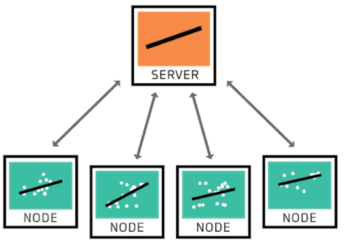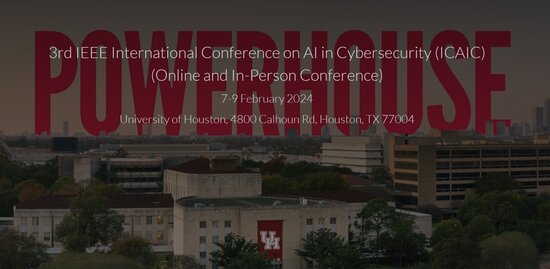
AIDE is a project that aims to accelerate the use of federated machine learning in the field of cybersecurity and the Internet of Things (IoT).
Domaine
Innovation themes
The goal of the AIDE project is to define and implement a federated machine learning platform and demonstrate its effectiveness through several case studies. Federated learning allows multiple clients to collaboratively train a machine learning model in a distributed manner. The process consists of the following three steps:
Federated learning therefore provides an integrated approach for sharing and learning from information without the need to share massive amounts of sensitive data in a centralized server, which provides substantial benefits in terms of security, privacy, and data protection. In addition, federated learning is more efficient in terms of resources as it replaces the sharing of huge datasets with the sharing of model parameters.
In order to create robust federated learning systems, potential vulnerabilities must be carefully evaluated and appropriate risk-based countermeasures must be developed.
A wide range of applications can benefit from federated learning. The AIDE project will start with two cases: one in the field of cybersecurity, where sharing sensitive information is crucial, and a second in Internet of Things (IoT) environments.
For cybersecurity, federated learning by sharing threat information can strengthen penetration testing, improve the synthesis of automatic code repair for vulnerabilities, and optimize malware analysis, threat intelligence, and intrusion detection. For IoT, the focus will be on predictive maintenance.
The AIDE project funded by the 2022 call “Financing of projects for the development of artificial intelligence in Belgium” was extended during the 2023 call for the thematic area “Cybersecurity and federated learning. The AIDE 2022 project worked with two case studies: one in the field of cybersecurity, where sharing sensitive information is crucial, and a second in Industrial Internet of Things (IoT) environments. In the extension of the AIDE project of the 2023 call, other case studies will be considered in addition to the two initial ones. They will be proposed by a valorization committee whose role is to propose/validate the choice of case studies and to measure the socio-economic impact. The extension of the project will make it possible to continue to pursue the initial objectives, but also to explore the link with access to large-scale data by linking it to the concept of “Data Space” and “SOLID data pod”. A “Data Space” is a digital infrastructure that allows the secure and reliable exchange of data between different organizations and individuals (interoperability). This is a key part of the European Data Strategy, which aims to make the EU a leader in a data-driven society. SOLID data pods are a type of data store that can be used to store data in a Data Space. SOLID data pods are decentralized, meaning they are not hosted by a central company or organization, making them more secure and private than traditional data storage. In this context, the Solid Lab project and the protection/access to medical data (linked to the projects in the other thematic areas of the 2023 call) have been identified as strategic. These aspects will be studied in WP4/WP3.
Agenda
25.04.2025

25.04.2025
CETIC talks
European Symposium on Artificial Neural Networks, Computational Intelligence and Machine Learning
En savoir plus
11.02.2025

11.02.2025
External activities
in the context of the AI Action Summit
En savoir plus
29.05.2024

29.05.2024
CETIC talks
The link between AI and Cybersecurity is the subject of the AIDE project involving CETIC, UCLouvain, KULeuven and IMEC. As such, the AIDE project...
En savoir plus
07.02.2024

07.02.2024
CETIC talks
Leandro Collier presented the paper: Secure federated learning applied to medical imaging with fully homomorphic encryption at the IEEE 3rd...
En savoir plus
Publications